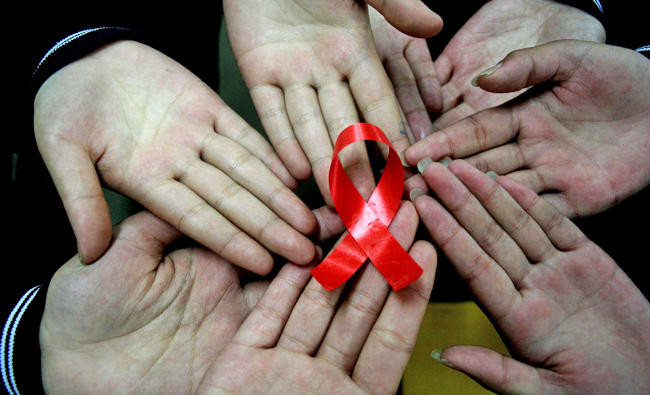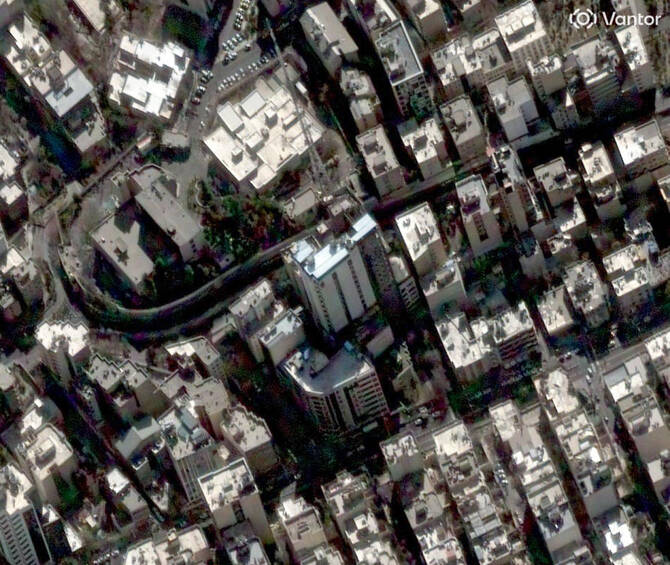JEDDAH: More people in the Middle East and North Africa (MENA) are dying from AIDS than 10 years ago, bucking the global trend in which the fatality rate is falling as more get treatment.
AIDS claimed a million lives globally last year, although the scales have tipped in the fight against the disease, with more than half of people infected with HIV now getting treatment, a UN report said Thursday.
Global AIDS deaths are now close to half of what they were in 2005, according to the UNAIDS agency.
But in MENA and eastern Europe and central Asia, AIDS-related deaths have risen by 48 percent and 38 percent respectively, it said, mostly due to HIV-positive patients not getting access to treatment.
Exceptions within these regions show that “when concerted efforts are made, results happen,” the report said, noting that in Algeria the rate of HIV treatment access increased to 76 percent in 2016 from 24 percent in 2010, and in Morocco to 48 percent in 2016 from 16 percent in 2010.
Community-based testing and treatment programs are reaching out to key populations in an increasing number of countries in the MENA region, according to the report.
Just over half of people living with HIV in the region know their HIV status. The report suggested that linkages between HIV testing and antiretroviral therapy initiation require strengthening, and that treatment adherence is a challenge.
In the MENA region, the annual number of adults and children dying due to AIDS-related illnesses increased from an estimated 3,600 in 2000 to more than 11,000 in 2016.
AIDS-related deaths more than doubled between 2000 and 2010 in Egypt, Iran, Kuwait, Morocco, Sudan, Tunisia and Yemen, which can be explained by increasing incidence in some countries and limited access to treatment in others. In countries where treatment coverage has expanded, AIDS-related deaths have decreased significantly since 2010 — for example, by 37 percent in Algeria and 28 percent in Djibouti.
According to the report, the annual number of new HIV infections in the Middle East and North Africa has remained stable since 2010, with an estimated 18,000 people newly infected in 2016.
Trends among countries in the region, however, have varied widely.
Since 2010, there have been substantial decreases in annual new infections in Morocco (42 percent), Iran (14 percent) and Somalia (12 percent).
In contrast, new infections rose by 76 percent in Egypt and 44 percent in Yemen.
Although relatively large increases in new infections occurred between 2010 and 2015 for Jordan, Kuwait and Qatar, the absolute number of new infections remains very small, in part because estimates from these countries are for citizens and exclude temporary migrant workers and other foreign nationals.
The report said that Iran, Sudan and Somalia accounted for about 65 percent of new HIV infections in the region in 2016. An additional 23 percent of new infections occurred in Djibouti, Egypt and Morocco, it added.
There was little change in the number of new HIV infections among children (aged 0–14) in the region between 2010 and 2016.
Most of the newly infected children were in Somalia and Sudan, which together accounted for around two thirds of the total.
The biggest reduction in new infections in children between 2010 and 2016 was in Djibouti, where the integration of services to prevent mother-to-child transmission into maternal and child health programs has been expanded.
— With input from AFP
AIDS deaths in MENA region on the rise, UN report finds
AIDS deaths in MENA region on the rise, UN report finds

Israel says it has launched ‘broad wave’ of strikes on Iran, as Tehran widens its response across the region

- US military says 17 Iranian navy ships destroyed, struck nearly 2,000 targets in Iran thus far
JERUSALEM/DUBAI: Israel’s military said Wednesday that it launched a “broad wave of strikes” on targets in Iran, after the Islamic republic fired rounds of missile barrages at Israeli territory.
The military said the targets of its latest strikes include Iranian “launch sites, air defense systems, and additional infrastructure.”
The latest wave of strikes came after Iran struck back against Israel and across the Gulf region, targeting US embassies and disrupting energy supplies and travel.
Air raid sirens rang out across multiple parts of Israel overnight as the military worked to intercept incoming Iranian fire.
There were no immediate reports of significant impact, although police said munitions fell in the Tel Aviv area, where one woman suffered mild shrapnel injuries.
Four days into a war that President Donald Trump suggested would last several weeks or perhaps longer, nearly 800 people have been killed in Iran, including some Trump said he had considered as possible future leaders of the country.
The US military said it has destroyed 17 Iranian ships, including a submarine, and struck nearly 2,000 targets in Iran thus far.
“Today, there is not a single Iranian ship underway in the Arabian Gulf, Strait of Hormuz, or Gulf of Oman,” US Central Command chief Brad Cooper said in a video posted to X.
Explosions rang out Tuesday in Tehran and in Lebanon, where Israel said it retaliated against Hezbollah militants. The American embassy in Saudi Arabia and the US consulate in the United Arab Emirates came under drone attacks. Iran has fired dozens of ballistic missiles at Israel, though most of the incoming fire has been intercepted. Eleven people in Israel have been killed since the conflict began.
In other developments, the Pentagon identified four US Army Reserve soldiers killed in a drone strike Sunday at a command center in Kuwait. The strike also killed two other service members.
The spiraling nature of the war raised questions about when and how it would end.
The administration has offered various objectives, including destroying Iran’s missile capabilities, wiping out its navy, preventing it from obtaining a nuclear weapon and ensuring it cannot continue to support allied armed groups.
While the initial US-Israeli strikes killed Iranian Supreme Leader Ayatollah Ali Khamenei and Trump urged Iranians to overthrow their government, senior administration officials have since said regime change was not the goal.
Trump on Tuesday seemed to downplay the chances of the war ending Iran’s theocratic rule, saying that “someone from within” the Iranian regime might be the best choice to take power once the US-Israel campaign is finished.
Trump says people the US had in mind to lead Iran are dead
Speaking Tuesday from the Oval Office, Trump said Reza Pahlavi, the exiled son of Iran’s toppled shah, is not someone that his administration has considered in depth to take over.
As far as possible leaders inside Iran, “the people we had in mind are dead,” Trump said.
“I guess the worst case would be do this, and then somebody takes over who’s as bad as the previous person, right? That could happen,” Trump said. “We don’t want that to happen.”
Iran’s leaders are scrambling to replace Khamenei, who ruled the country for 37 years. It’s only the second time since the 1979 Islamic Revolution that a new supreme leader is being chosen. Potential candidates range from hard-liners committed to confrontation with the West to reformists who seek diplomatic engagement.
Israel and US strike nuclear facilities and other targets in Iran
Information coming out of Iran has been limited because of poor communications, round-the-clock airstrikes and tight restrictions on journalists. But explosions rang out across Iran’s capital.
The Israeli military said it conducted a wave of airstrikes on Iranian sites that produce and store ballistic missiles. It also said it destroyed what it called Iran’s secret, underground nuclear headquarters. Without providing evidence, it said the site was used for research “to develop a key component for nuclear weapons.”
“The regime attempted to rebuild its efforts and conceal them, thinking we wouldn’t notice. They were mistaken,” said Israeli military spokesman Brig. Gen. Effie Defrin.
There was no immediate public comment from the US or Iran about the site Israel named.
Iran has said it has not enriched uranium since June, though it has maintained its right to do so and says its nuclear program is peaceful.
Fears rise in Tehran as bombardment of capital intensifies
New rounds of US and Israeli airstrikes rattled Iran.
“Since midnight, I and my wife are hearing sound of explosions,” said Ali Amoli, an engineer living in north Tehran.
Satellite images published Tuesday by Colorado-based company Vantor showed the domed roof of Iran’s presidential complex in Tehran had been destroyed, supporting Israel’s claim of an overnight strike. Iran did not acknowledge the damage or report any casualties.
A north Tehran resident who spoke on condition of anonymity for fear of retaliation described growing fears amid the heavy bombardment. The resident said most stores in the normally bustling area of Tajrish were closed, though bakeries and supermarkets remained open.
Iran hits US Embassy in Riyadh and Washington pulls out staff
An attack from two drones on the US Embassy in Riyadh caused a “limited fire,” according to the Saudi Arabian Defense Ministry, and the embassy urged Americans to avoid the compound.
An Iranian drone struck a parking lot outside the US consulate in Dubai, sparking a small fire, Secretary of State Marco Rubio said in Washington. He said all personnel were accounted for.
The United Arab Emirates said it has intercepted the vast majority of more than 1,000 Iranian missile and drone attacks against it.
US embassies in Saudi Arabia, Kuwait and Lebanon said they were closed to the public.
The US State Department ordered the evacuation of non-emergency personnel and family in Kuwait, Bahrain, Iraq, Qatar, Jordan and the United Arab Emirates. And US citizens were urged to leave more than a dozen Middle Eastern countries, though many were stranded because of airspace closures.
The State Department said Tuesday it’s preparing military and charter flights for Americans who want to leave the Middle East. Several other countries also arranged evacuation flights for their citizens.
The US-Israeli strikes have killed at least 787 people in Iran, according to the Red Crescent Society. In Lebanon, where Israel launched retaliatory strikes on the Iranian-supported militant group Hezbollah, 50 people were killed, including seven children, Lebanon’s health ministry said.
In addition, three people were killed in the United Arab Emirates, and one each in Kuwait and Bahrain.
The US military has confirmed six deaths of American service members.
Four of the American soldiers killed were identified as Capt. Cody A. Khork, 35, of Winter Haven, Florida; Sgt. 1st Class Noah L. Tietjens, 42, of Bellevue, Nebraska; Sgt. 1st Class Nicole M. Amor, 39, of White Bear Lake, Minnesota; and Sgt, Declan J. Coady, 20, of West Des Moines, lowa, who received a posthumous promotion in rank. They were assigned to the Iowa-based 103rd Sustainment Command.
Turkish Foreign Minister Hakan Fidan on Tuesday criticized Iran’s attacks against Gulf neighbors that had worked to prevent war as an “incredibly flawed strategy” that threatened to widen the war if those states decide to retaliate.











